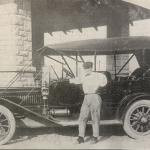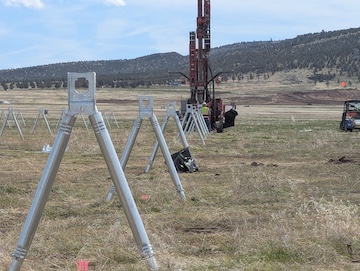Flashback: Price tag on truck route skyrockets in 2000
Published 4:48 pm Tuesday, June 17, 2025


100 Years Ago
June 25, 1925 — Issue missing
75 Years Ago
June 22, 1950 — Very Few Beds Gained in Bend Or Prineville
Very few beds are added to the area by the hospital projects in Bend and Prineville, according to figures from the Oregon state board of health.
Most of the beds by far in these projects are replacements of beds that have long been in use, but are no longer accepted by the state board of health.
Of the 74 beds in Bend in 1949, not one was listed as acceptable by the state, although 35 were listed as subject to acceptance after major alterations. The new St. Charles addition will replace many of these old beds, and will add only about 15 to the total.
All of the 23 beds then in use in Prineville were listed as totally unacceptable. They have since been entirely replaced by the 35 beds in the new hospital there, a gain of 12 beds.
REA Receives Bid Of $221.030.86
A low bid of $221,030.86 for constructing 113 miles of distribution lines was opened last Thursday evening by the Central Electric Co-operative board of directors.
The bidder was W. R. Grasley company of Portland. Actual construction can not be started, according to Co-op Manager John Norlin, until the bid receives final REA approval in Washington.
The 113 miles of lines are to go from Sisters to Samp Sherman, from Madras to Grizzly, and from Prineville to Post.
All Potato Men Asked to Come To Meeting Here
To discuss matters of mutual interest concerning shipping point inspection service, all potato growers and handlers of central Oregon are to meet here Friday, July 14.
The meeting will be held at 8 p.m. in Westminster hall, announces W. R. Stanard, district supervisor of the shipping point inspection service.
E. L. Peterson, director of the state department of agriculture, Frank McKennon and W. L. Closs, representing the department and the federal-state shipping point service, will conduct the session.
50 Years Ago
June 25, 1975 — To do sewer design, city retains engineer
The Redmond City Council last night agreed to enter a contract with the Beaverton engineering firm of Robert E. Mayer Engineering Inc. to engineer the design phase of the city’s proposed sewer system.
The council unanimously agreed to hire Mayer upon the recommendation of the city’s sewer committee. Mayer has already completed the facility planning phase of the sewer project.
He was paid for that work with a $57,000 loan to the city of Redmond from the Oregon Department of Environmental Quality (DEQ).
The design phase of the engineering work won’t be done until the city receives an anticipated $11.2 million grant from the federal Environmental Protection Agency (EPA).
If the EPA grant is not forth coming. Mayer will not do any engineering work, according to the agreement between the city and the engineering firm.
“He’s not going to proceed until we say go, and we aren’t going to say go until we’ve got the money,” Redmond Mayor Ron Bryant said.
The contract did not contain at specific cost for the design phase of the sewer project. The project includes a sewer interceptor system for the entire city and a sewage treatment facility.
But Mayer told the council he estimates the engineering of the project, including providing inspectors to scrutinize construction, will be about 10 per cent of the cost for the entire project.
The project is expected to cost $14.989 million, which means the engineering is expected to cost almost $1.5 million.
Because of council action last night, the city’s hotel-motel tax is on the books.
City Attorney Stanley Clark read the lengthy ordinance at the meeting. It was its second reading. The tax will become effective Aug. 1.
The ordinance, modeled after the city of Bend’s hotel motel tax, establishes a 5 per cent tax on hotel and motel rooms as well as on mobile home space rentals. It will not affect persons who stay-in such facilities more than 30 days.
The ordinance also establishes a special fund for promotion of the city.
The fund will include 5 per cent of the revenue collected by the tax up to $700 yearly. The city will use the money to enter into a contract with the Redmond Chamber of Commerce for the promotion.
English has estimated the city could collect as much as $12,000 annually from the tax.
The council last night also unanimously approved an increase in the city’s garbage rates. The rate hike was requested by the holder of the city’s garbage franchise, Central Oregon Disposal Service. The increase was recommended by the city’s sewer committee.
The new rates will take effect Aug. 1.
The rate for the first three 32-gallon garbage cans if they are set out on a curb was increased to $2.25 per month from the current monthly rate of $1.95. The rate for any additional can placed on the curb (after the first three) was increased from 50 cents to 75 cents per month.
If the can must be carried out, the rate will increase from its present $1.95 per month (for the first can) to $2.25 per month. For any additional can to be carried out, the rate will be $1.25 per month, compared to the old rate of $1.10.
Commercial rates for cans will increase by 35 cents per month for the first can to a monthly rate of $2.
Rates for pickup of larger commercial garbage containers will also increase.
— Recommended that a proposed city parking meter ordinance allow placement of meters anywhere in the city’s commercial zone. The council emphasized that this does not mean meters are planned throughout the commercial zone. It will just provide the city with a method of placing meters in the zone if it so desires in future years. The proposed ordinance is being formulated by the city’s parking meter committee:
— Approved an application form for persons wishing to gamble socially under provisions of the new city ordinance, which takes effect on July 10.
25 Years Ago
June 21, 2000 — Price tag on truck route skyrockets
Construction of an alternate route to divert truck traffic from downtown could cost $9 million to $14 million there to build than expected, Redmond City Council learned Tuesday.
That information surfaced recently when the city and the Oregon Department of Transportation were finalizing the reallocation of $4 million in federal money from the Highland Avenue-Highway 97 intersection to the north-south alternate route for the highway.
The original “very preliminary” cost estimate for construction of the alternate route was $19.8 million, said Bob Bryant, ODOT’s regional manager in Bend.
But a closer examination of costs associated with traversing the area near Evergreen Avenue and Canal Boulevard put preliminary cost estimates at $29 million to $34 million.
“That’s the portion with the most challenges,” he said, noting Eberhard’s Dairy, the canal and the electric substation.
The council and ODOT representatives will meet at green Avenue and Canal 7 a.m. Thursday. ODOT will “add detail” to the information the council has about the alternate route, and will be “framing the question of whether or not to proceed we are at today,” Bryant said.
In addition to the $4 million in federal money, the city’s Downtown Urban Renewal District has $12 million to help fund the project.
That $16 million doesn’t come close to funding the project based on the the newest estimates.
“The critical factor is timing.” Fitch told the city council Tuesday. “I’d rather figure it out sooner rather than later. The clock is ticking on the $4 million.”
Councilors and ODOT will attempt to find interim solutions to Sixth Street traffic. If they can, Fitch said, he is confident ODOT would support the city’s effort to get $10-15 million in the next round of federal highway grants in 2004.
While some councilors blame ODOT for the alternate route glitches, Fitch said. “We have a quality of life problem; they (ODOT) have a mobility problem. We’re both frustrated by lack of money.”
Hospices back away from planned merger
The boards of two local County hospices backed away from a proposed merger Saturday over “philosophical differences.”
“We just got to a point where we couldn’t agree on something, so we decided to work together and just not merge,” said Russ Algers, board chairman of Hospice of Redmond, Sisters and Grant County.
That hospice began talks with Hospice of Bend-La Pine earlier this spring. In May, the two boards agreed in principle to merge, but had not talked about details.
Hospices provide care for terminally ill patients.
Discussion of details occurred Saturday in a joint meeting of the boards. Neither side wanted to say what their disagreement was.
“Each board approached this in good faith…, said Greg Hendrix, board chairman of Hospice of Bend-La Pine. “To use a worn phrase, the devil is in the details.”
The non-profit hospices were interested in merging as a way to fight rising costs and falling revenues that are beleaguering many hospices around the country.
Algers and Hendrix both said the boards left the meeting informally agreeing to continue cooperating when they can. They might cooperate in such areas as bulk purchases of medical supplies, joint training and in shared staffing during heavy patient loads, Hendrix said.







